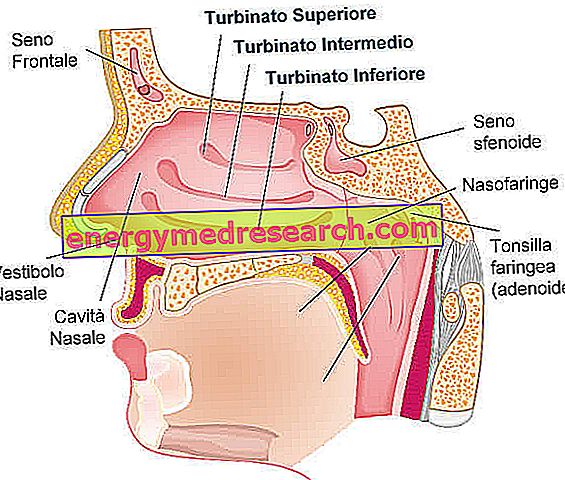Snoring is a phenomenon that occurs during sleep.
"Snoring" means the emission of an annoying noise similar to a grunt, caused by the impairment of pulmonary ventilation.

- Impairment of sleep-wake cycles.
- Increased risk of sleep disorders (in particular Obstructive Sleep Apnea Syndrome - OSAS) and related complications.
- Worsening of lifestyle: both of those who snore and of roommates.
The mechanism responsible for snoring is the complication of the passage of air during breathing.
NB . Snoring is typical in people with sleep apnea and sleep disorders.
What to do
- Make sure that sleep apnea and other OSAS symptoms do not appear in addition to snoring.
- In this case, contact a specialist center for the treatment of sleep disorders.
- The use of Continuous Positive Airway Pressure (CPAP) can be very useful.
- Search for the root cause. To be carried out initially independently, it consists in identifying some predisposing factors:
- Obesity and fat storage around the neck.
- Excessive alcohol consumption.
- Tobacco addiction.
- Use of sedative drugs.
- If detected, removal of the trigger:
- Follow a proper diet and a healthy lifestyle to reduce neck circumference and total weight (the latter at least 10%).
- Intervening on alcohol abuse.
- If possible, replace or reduce the sedative drugs with others that cause the disorder.
- In the event that none of the factors listed above is present, it becomes necessary to contact the primary care physician, who will assess the relevance of a specialist otolaryngologist visit.
- The specialist will look for the presence of:
- Macroglossia: excessive growth of the tongue.
- Retrognathia: small chin and moved backwards.
- Adenoids and hypertrophic tonsils.
- Deviation of the nasal septum.
- Nasal polyps.
- Accumulation of secretions in the upper respiratory tract (mucus and phlegm) and hypertrophy of the mucous membranes (rhinitis and / or sinusitis).
- Softening of the muscles located in the soft palate with reduction of the lumen of the first airways.
- In the absence of any functional anatomical defect and in the presence of specific risk factors, it will be advisable to turn to a center for sleep disorders.
- On the contrary, sometimes the otolaryngologist will be able to solve most of the problem by resorting to surgery, aimed at restoring effective and efficient ventilation.
What NOT to do
- In the case of obesity, especially when the deposit is also concentrated around the neck, it is important to avoid:
- High-calorie diet.
- Sedentary lifestyle.
- Alcohol.
- Eat long before sleep.
- Drink alcohol before sleep.
- Smoking, especially before sleep.
- Use drugs with sedative effect.
- Ignore or underestimate sleep apnea.
- Sleep in the supine position.
- Smoking a lot.
- Do not take a specific diagnostic path.
- If necessary, do not resort to surgery or other medical therapies.
What to eat
- The diet that prevents and reduces snoring is based on:
- Hypocaloricity: the energy must be 30% less than the calories needed to maintain a stable weight, with the aim of losing weight (advice valid only if the weight is excessive).
- Evening meal not exceeding 30-35% of total calories. In a 2000kcal diet a proper dinner could include 200g of grilled chicken breast, 200g of salad tomatoes, 60g of bread (2 slices) and two tablespoons of oil.
- Chew thoroughly.
- Favor moderate portions.
- Prefer light and digestible foods:
- Little fat, therefore only slightly seasoned; in the case of cheeses, choose lean ricottas and light cottage cheese.
- If proteins, medium cooked (not to the blood or even overcooked).
- If a prevalence of carbohydrates, with the right amount of fiber (portions less than 300g of vegetables, cereals and legumes possibly shelled etc.).
- Eat foods cooked with light and digestible systems:
- Affogatura.
- Steam powered.
- By pressure.
- Vacuum packed.
- Vasocottura.
- Baked in foil.
- In a pan over low heat.
What NOT to Eat
In the case of obesity, it is advisable to reduce the weight leaving the balanced distribution of the diet unchanged:
- It is advisable to eliminate junk foods and beverages, in particular fast foods and sweet or savory snacks.
- It is also necessary to reduce the frequency of consumption and the portions of: pasta, bread, pizza, potatoes, derivatives, fatty cheeses, meat and oily fish, salami, sausages, sweets, etc.
Before sleep it is necessary to avoid:
- Alcohol.
- Abundant meals.
- Large portions, especially low-digestible foods such as whole milk.
- Foods high in fat, especially fast food, fried or fried and junk food in general.
- Foods rich in connective tissue such as pork rinds, offal, molluscs, etc.
- Foods too rich in indigestible fibers: for example large portions of stewed or raw legumes.
- Foods that delay the emptying of the stomach by increasing the possibility of acid juice (gastroesophageal reflux and regurgitation) rising.
- Carbonated soft drinks, which increase the amount of air present in the gastric sac.
Natural Cures and Remedies
Some natural remedies to fight snoring are:
- Nasal patch: designed to increase the flow of air from the nostrils.
- Herbal tea or valerian extract: improves sleep quality.
- Essential oils: dissolve the mucus and reduce the inflammation of the mucous membranes in the upper airways.
Pharmacological care
In some cases, drugs are used that prevent daytime lethargy and promote nocturnal sleep; however they are more used in the treatment of sleep disorders proper:
- Modafinil (eg Provigil).
- Theophylline (eg Aminomal Elisir, Diffumal, Respicur).
- Caffeine citrate (eg Nymusa).
- Amphetamine and Destrohamphetamine (eg DextroStat, Adderall, Dexedrine).
Prevention
- Prevent or cure overweight.
- Eat little in the evening hours and avoid counterproductive practices (alcohol, cigarettes, etc.).
- Perform the necessary clinical investigations (otorhinolaryngology, etc.).
- Perform therapies aimed at eliminating the underlying cause (drugs, surgery, etc.).
Medical Treatments
- Surgery to correct anatomical defects concerning the upper airway. I am pertaining to otorhinolaryngology or maxillofacial. mainly:
- Septoplasty.
- Reduction of turbinates.
- Tonsillectomy.
- Adenoidectomy.



